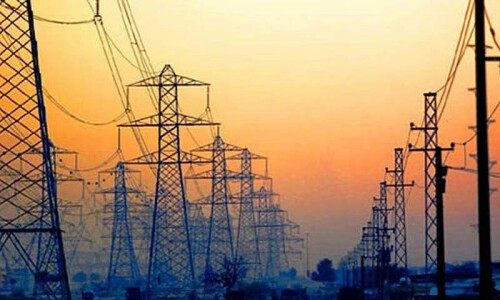
PAKISTAN’S is a society in perpetual flux. We still have to find our moorings, to decide who we are. We are doubtless trying to resolve our identity crisis though without success.
To have settled for being ‘consumerist’ is surely not enough. That does not make for determinacy or make us stand out as a people. There is much of a muchness about it. It smacks of the likes of Donald Trump. It is among the givens of modernity.
Those we refer to as the ‘privileged’ of the country have been engaged, over the years, in an assertion, through a mindless amassing of money, white or black — the colour doesn’t matter — of a ‘classy’ identity.
They espouse glitter at a variety of levels and with infinite permutations. Yesterday’s ‘Pajero culture’ has, for example, given way today to a Prado and Vigo culture. That, presumably, is a statement about such an identity.
If we are to get it right as a society, we cannot afford to write off all ideals.
However, that is a misconception. That does not have to do with classiness or what we call class. First of all, class is other than sleaze. Also, it cannot be constructed. It is a rather more esoteric phenomenon. It resides in suggestion rather than statement. It shuns the vulgarity of display. It is not a monkey. It does not perform.
We refer to the behaviour of those who do, regardless of their antecedents, as ‘nouveau’. Though they have been around for quite a while — and there are numerous sell-outs among them — they are the new people of an unmistakably ‘new’ Pakistan.
One wonders when the ‘old’ Pakistan ceded to the new. It is hard to affix an exact date to this happening but there certainly was a time when things were different.
Substance mattered. Even the meaning of substance was different. It pointed not to material value but to intrinsic worth. There was a culture of mind and spirit.
Leaders of yore — Liaquat Ali Khan and Shaheed Suhrawardy — did not, for instance, aim to bedazzle the poor with their billions because they had none and would probably not have aspired to.
To do so is, in any case, simply to propagate false values — and, more importantly, to encourage criminality — not just among the poor but society at large.
What matters — or should matter — to thinking people in the country today is therefore perhaps, even more than the issue of corruption, the larger question of overall social direction.
It would seem that we have got it all wrong. Ours is too close for comfort to the American dream. To make good individually is really not the answer in the context of a Third World country.
The issue is not ethical or moral but societal or even anthropological. Perhaps we should be asking ourselves whether — or to what extent — we are developing in purely human terms or adding to ourselves collectively in terms of human value.
Sadly, we are not. If we were, then we would be thinking about our own kind and our top priority would be to educate and, at the same time, try to lift the millions out of their subhuman existence and poverty. That is clearly not the case.
No individual government is entirely to blame. Each successive government comes armed with the same blinkered thinking as its forerunner and, under cover of laissez faire, fails to deliver. We have fallen into a pattern which has become a trap.
We currently have recourse to China —and Chinese assistance — in several different areas. Cynics are heard saying that we shall all soon be speaking — or learning — Chinese.
However, cynicism is not an option. If we are to get it right as a society, we cannot afford to write off all ideals. That does not mean that we should settle for misguided national fervour or demagoguery.
We are passing through a sensitive phase in our history and, much as we may desire it, cannot allow ourselves the luxury of a political gamble in the name of change.
As we have seen in the case of the US, democracy is not always — necessarily — right. Populism can easily be a recipe for disaster. Zulfiqar Ali Bhutto’s socialist revolution may have raised social and political awareness in this country but it also had a downside. At some level, it has also bred anarchy.
Something else has similarly happened that has had a negative impact on society. Class and authority — and the law — have all been demythologised. The common man respects — and is afraid of — nothing and no one.
The result is, inevitably, an increase in crime and violence. We are plagued both by danger and a growing sense of alienation. The state owes us more — and better — than this. We deserve as much. We reserve the right to forego despair. One wonders who — or what — will stem the tide. The present is an interim leading nowhere.
The writer is the founder chairman of Dialogue: Pakistan, a local think tank.
Published in Dawn February 6th, 2017










































